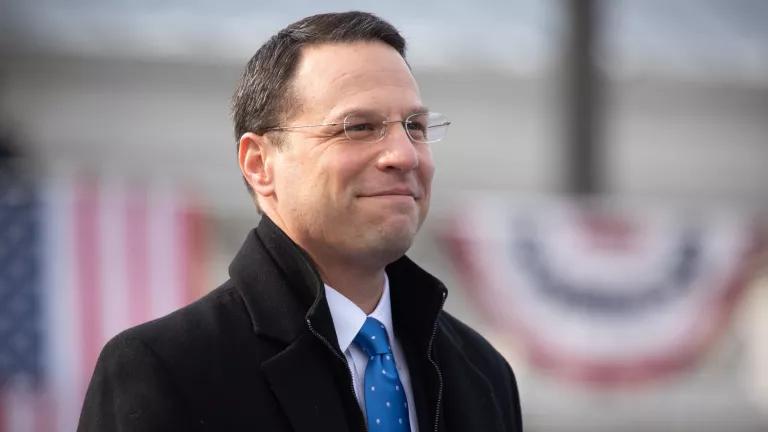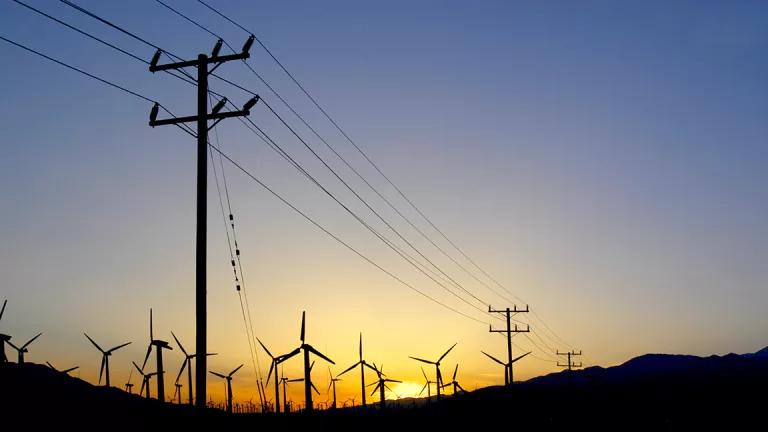
Pennsylvania Governor Josh Shapiro
As September came to a close, Governor Josh Shapiro issued a press statement announcing that the Regional Greenhouse Gas Initiative (RGGI) Working Group he convened earlier this year had concluded its work after months of collaborative meetings. The group—comprised of environmental stakeholders, organized labor, energy industry representatives, and consumer advocates—reached historic consensus on Pennsylvania energy policy, as demonstrated by the group’s final recommendations to Governor Shapiro in a four-page memorandum. Specifically, the group reached consensus that “a form of cap-and-invest carbon regulation for the power sector that generates revenue to support the Commonwealth’s energy transition is the optimal approach moving forward.”
Throughout his campaign—and upon taking office on January 17, 2023—Governor Shapiro committed to bringing a diverse group of stakeholders together around the table to lower the temperature on RGGI rhetoric and critically evaluate how RGGI fulfills his three-part test on climate and energy policy. He has now followed through on his commitment. Friday’s announcement also publicly disclosed the names and organizations of all participants in the Working Group. The Shapiro administration had previously publicly noted the group’s co-chairs: NRDC’s Jackson Morris and Michael Dunleavy, retired leader of the International Brotherhood of Electrical Workers (IBEW) Local 5 in Pittsburgh.
Now, think back to October 3, 2019—that’s when Governor Wolf signed an executive order directing the Department of Environmental Protection (DEP) to promulgate a cap-and-invest regulation to cut carbon pollution from Pennsylvania power plants sufficient to link with RGGI. Needless to say, there have been many twists and turns in the four years since. The announcement about the RGGI Working Group provides a great opportunity to remind ourselves: what is RGGI’s current status in Pennsylvania; where do the various lawsuits stand; what has Pennsylvania already lost in terms of RGGI investment opportunities; and what comes next?
How Did We Get Here?
After a years-long rulemaking process, DEP published its CO2 Budget Trading Program regulation to participate in RGGI on April 23, 2022. Although the regulation was already facing substantive challenges in state court before publication (did I mention twists and turns?), its requirements became effective as law. Pennsylvania fossil fuel-fired power plants with capacity of 25 megawatts (MW) or greater were scheduled to have compliance obligations commence on July 1, 2022. Immediately after publication, certain coal-fired power plants and labor groups filed a second lawsuit; this challenge was handled by the PA Commonwealth Court in parallel to the existing lawsuit as a related case, although never formally consolidated.
The challengers in each action petitioned Commonwealth Court for a preliminary injunction (PI), asking the court to enjoin DEP from enforcing/implementing Pennsylvania’s RGGI program while the merits of the case proceeded through full briefing and argument; they alleged they would otherwise suffer immediate and irreparable harm. After oral argument on the PI petitions in May 2022, the court engaged in an unfortunately cursory analysis balancing the harms among the various parties and eventually granted the PI in an order and opinion issued on July 8, 2022. Since that time, DEP has been blocked from participating in RGGI’s regional quarterly auctions or administering the program in any way (DEP appealed the injunctions to the Supreme Court of Pennsylvania).
Foregone Benefits to Pennsylvanians
An analysis of RGGI’s auction clearing prices since January 2022 (when the Wolf administration was prepared to have Pennsylvania participate), and the likely supply of allowances that DEP would have made available for sale at each of the seven allowances since then, reveals that our Commonwealth has already forgone nearly $1.5 billion in RGGI proceeds as a result of legislative and legal delays. The most recent quarterly auction held on September 6th saw a clearing price of $13.85 per allowance (one allowance = a limited license to pollute one short ton of CO2). Considering Pennsylvania would have projected to offer roughly 15.2 million allowances for sale, that translates to $210.5 million in lost proceeds for Pennsylvania from that auction alone (assuming the allowance clearing price remained unchanged).
By law, these proceeds would have been deposited in the Clean Air Fund and ultimately invested in programs to eliminate air pollution, such as renewable energy, energy efficiency, and greenhouse gas abatement programs; DEP has the authority under existing law to target those clean energy investments in communities facing the retirement of coal power plants, as well as in environmental justice communities, thereby ensuring the job creation, economic development, and public health benefits are realized by those who need them the most.
Indeed, the proven track record of success from the 11 other RGGI participating states since 2009 shows that these investments (over $6.7 billion total) deliver results in reduced air pollution, increased public health, and lower energy bills. Pennsylvania’s power plants are the third-dirtiest in the country (CO2 emissions estimated at 82.64 million short tons in 2022), and over 10% of PA residents suffer from asthma, making these lost opportunities all the more alarming. Even more, Pennsylvania’s inability to benefit from RGGI participation risks the Commonwealth missing out on nearly $1 billion in uncapped federal clean energy tax credits by 2039.
What Comes Next in the Courts?
Parties to the lawsuits (and the rest of us!) continue to await decisions from Pennsylvania’s courts on RGGI. A panel of Commonwealth Court judges heard oral argument on the merits of the challenges to RGGI’s constitutionality and lawfulness in Philadelphia back on November 16, 2022. Separately, after full briefing, the PA Supreme Court heard oral argument on DEP’s appeal of the lower court’s PI order blocking RGGI implementation in Harrisburg on May 24, 2023. Either court could issue a decision at any time. And however Commonwealth Court decides the cases on the merits, there will likely be an appeal sought by the losing parties to the PA Supreme Court. Of note, back in November 2021, as Attorney General, Josh Shapiro approved the final-form RGGI rule as to form and legality. Expect a thorough NRDC blog analyzing the next court decision that drops shortly after its release.
Action Items from the Working Group
As for the RGGI Working Group, per the announcement on Friday, its work has concluded. The ball is now in Governor Shapiro’s court to decide how to move forward with the group’s recommendations. Those include the establishment of a broader “State Energy Policy Collaborative,” which would provide input on a statewide energy plan to inform statewide energy policy adoption and implementation; those efforts could include the exploration of an integrated resource planning type approach, with an emphasis on reliability, affordability, and emissions reductions.
The Working Group also recommends initiating outreach to other states within the PJM footprint (PJM is the regional transmission organization that manages the wholesale dispatch of electricity within Pennsylvania, parts or all of twelve neighboring states, and the District of Columbia) to craft or reach consensus on a regional carbon trading program. Some PJM states already participate in RGGI (Pennsylvania, Delaware, Maryland, New Jersey, Virginia), while others do not (Illinois, Indiana, Kentucky, Michigan, North Carolina, Ohio, Tennessee, West Virginia). One of the most common anti-RGGI talking points - one that has often been wielded in bad faith - concedes that while it might reduce carbon emissions from PA power plants, it would incentivize electric generation and associated emissions to “leak” across borders to states that don’t put a price on carbon. According to opponents, this theoretical emissions leakage would offset any carbon reductions in Pennsylvania and ultimately yield no net climate benefit.
PJM has previously explored the possibility of implementing a carbon price adder, but the Working Group’s recommendation is particularly wise given the EPA’s recently proposed federal carbon pollution standards for new/modified and existing power plants nationwide. Once finalized, those standards will establish a national baseline for the best system of emission reductions from fossil-fired power plants. Cap-and-invest programs like RGGI can serve as a cost-effective and flexible compliance pathway for states, which will have to adopt their own rules for existing plants that are at least as stringent as EPA’s standards. Opening a dialogue with other PJM states on a broader regional cap-and-invest program could ensure that leakage across state lines is minimized and that shared benefits are maximized from RGGI participation. Even if that dialogue does not yield action by non-RGGI states to adopt a carbon price on their respective power plant fleets, PJM can and should revisit the application of a “border adjustment” on imports and exports of electricity across state lines to avoid wholesale market distortions and any potential emissions leakage.
Still More to Come
Despite last week’s announcement on historic (although not quite complete) consensus, much still remains up in the air. As we await court decisions, the next regional RGGI auction is scheduled to take place on December 6, 2023. It’s safe to project that Pennsylvania’s participation (if allowed) would return at least $100 million in proceeds to the Commonwealth for reinvestment in our communities. And potentially much more. There’s a reason why RGGI is described as the most significant climate and clean energy policy ever enacted in Pennsylvania. It’s also why public health advocates, business groups, environmental groups, frontline communities, consumers, and faith organizations are all counting on Governor Shapiro to stay the course. He can make history by showing the nation that we can, in fact, meaningfully address climate change, grow the economy, and create good jobs right here in the Commonwealth.



